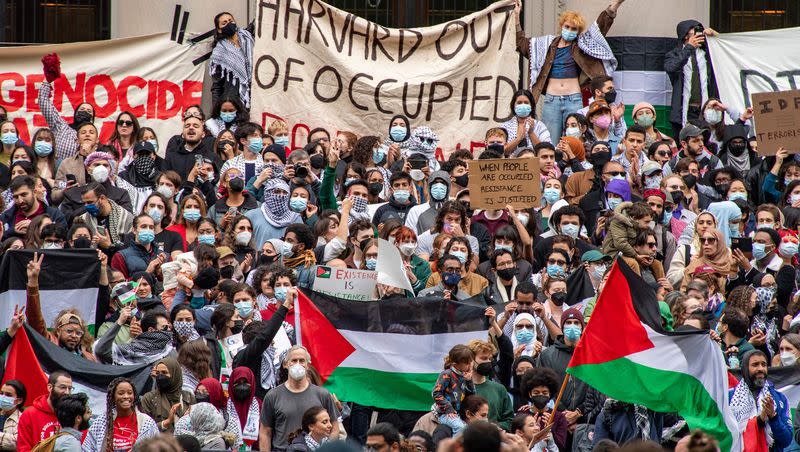Progressive college students thought they had the upper hand in our culture. They lost it this week

Just like it’s hard to feel sorry for the tanking New England Patriots, it’s hard to feel sorry for Harvard students under fire.
Like professional football players who are paid eye-popping salaries to work out regularly and play a game, students at Harvard and other elite schools are widely regarded as the crème de la crème of their generation, poised for social and professional success on a track that seems to have been greased for them, if only by their own hard work.
But watching the doxxing of young people over their statements of support for Hamas is unsettling after the all-too-human sense of schadenfreude passes. It feels like some tenuous thread of cancel culture has snapped, plunging us all into darker territory.
As The New York Times reported, pro-Palestinian students who issued a statement “holding the Israeli regime entirely responsible for all unfolding violence” have been subjected to doxxing and hatred over the past 10 days. Even though the statement was attributed only to “Harvard Palestine Solidarity Groups,” angry people obtained the names of students associated with the groups and posted their personal information online. Several Wall Street executives asked Harvard to release the groups’ rosters to ensure “that none of us inadvertently hire any of their members.”
Additionally, the Times reported that “a truck with a digital billboard — paid for by a conservative group — circled Harvard Square, flashing student photos and names, under the headline, ‘Harvard’s Leading Antisemites.’”
This is no hanging of suspected witches, as took place 25 miles north of Cambridge in 1692. But the vitriol spilling out on Harvard’s campus and beyond is a potentially dangerous manifestation of what we lightly call cancel culture, with ramifications that will linger. And it comes at a time in which tensions are roiling internationally, as well as in our own families.
There is a sharp generational divide in how Americans view the Hamas attack and Israel’s response, and it’s playing out not only at Harvard but other schools in the Ivy League. At Columbia University in New York City, student groups issued a statement calling Israel “a settler-colonial oppressor” and the Hamas attack a “historic moment for the Palestinians of Gaza, who tore through the wall that has been suffocating them in one of the most densely populated areas on Earth.”
It’s tempting to think that these statements, issued before the savagery of the attacks was fully known, were the work of a handful of students who acted impulsively, as young people often do in their naïveté and zeal. But they are representative of a trend.
In a poll conducted last week, just 48% of Americans under the age of 45 said America should publicly support Israel in the war, compared to 78% of those 45 and older.
Two years ago, even though American evangelicals as a whole have been staunch supporters of Israel, a survey of evangelicals ages 18 to 29 found that 33.6 % sided with Israel, 24.3% with Palestinians and 42.2% were neutral. It was, as the Times of Israel reported, a “significant shift” from three years prior, when 69% of young evangelicals sided with Israel, 5.6% with the Palestinians.
Related
As the events of the past week have shown, we’ve been sitting on a powder keg of political and generational tension about Israel and Gaza for years, and it’s exploded on our campuses, where young progressives had begun to think they had the upper hand on the culture. College students have, in recent years, had success in blocking speakers they found objectionable and forcing a national conversation about pronouns, but until now, no lives were at stake in their causes and the backlash has been mild.
University faculty and administrators have also found themselves caught up in the fray, because of celebratory statements about the Hamas attack or silence about their students’ actions. Former Harvard President Lawrence H. Summer, in particular, has sharply criticized the current administration’s lack of leadership during what he rightly called “this time of moral testing.”
But he has taken a measured approach when it comes to the censure and blacklisting of students, saying on Bloomberg’s “Wall Street Week Daily” that many of the Harvard students who belonged to the pro-Palestinian groups either didn’t know about the statement or didn’t fully understand what they were signing up for when releasing it.
“Some I’m sure were naïve and stupid,” he said. “I don’t think this is a time for individual vilification. It’s not a time for demonizing Israel, and it’s not a time for demonizing students who weren’t careful or who were silly in what they did.”
Now, as the world watches and prays over events most of us have no control over, it’s tempting to “cancel” the young and the foolish for their statements about terrorist acts in Israel, which all people should resolutely condemn.
But this is not the cancel culture that existed prior to Oct. 7, when we were canceling each other over promotional beer cans and allegedly transphobic tweets. This is different; the tension palpable, the air more flammable. And the way we respond to each other right now will affect how we relate to each other in coming years. We all need to be the grown-ups, not the kids.
